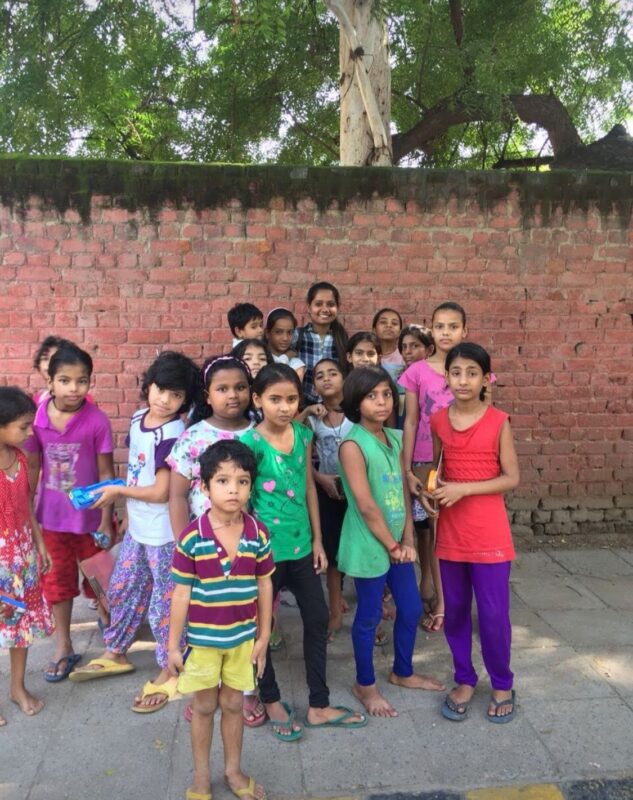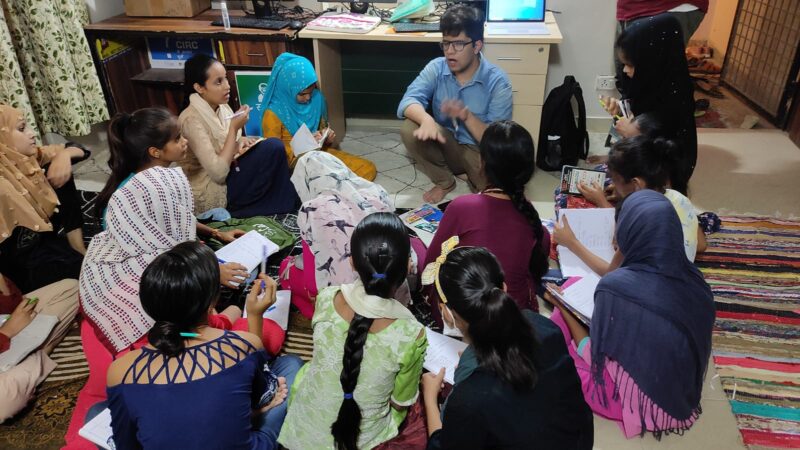The role of teachers does not just revolve around reading, writing, and arithmetic, but shaping young lives. A good teacher brings out the best in students and motivate them to strive for greatness.
For a nation, students are its future and teachers are regarded as credible guides for their progress. At the very least, make a child a better human being. This is what the four young idealists in this special report believe.
Gunjan Rana, 24, welfare officer
It all started in 2015 when Rana became a student of social work. Her visit to poverty-stricken regions of Delhi acted as a kindle of motivation towards the noble profession of teaching.
Soon, she found that taking classes for children and cheering them up made her “feel fantastic”. “These youngsters have a lot of ability that is being squandered. They should be given at least the basic minimum,” she says. “I decided to teach them on my own and to the best of my skills.”
She continues, “I organised a group, and we began to seek out undeveloped clusters. Finding the correct place for our courses was occasionally difficult, but we persevered and were able to teach numerous young people the fundamentals of the alphabet, numbers, tables, and so on.”

EAGER LEARNERS: The children Gunjan Rana teaches in Seelampuri
The volunteers also felt it was incumbent on them to arrange entertaining activities alongside studies so that the children felt engaged and were lured to study.
Rana has organised several unofficial education camps in places such as Old Seelampuri, Dallupura, Kondli, Shankar Camp, Moti Bagh, Govindpuri, Panchsheel Park, Kardampuri, and IP extension in the last seven years, Despite having a regular job, Rana still finds time to visit some areas, and not surprisingly, the majority of the children she taught still remember her.
Apala Sharma, 23, Student
While still in college, Apala Sharma organised Pathshala, a group of about 25-30 fellow students to teach kids who could not attend school during the lockdown so that they did not miss out on their studies in Sundar Nagri.
Before she undertook this initiative, Sharma and her team had travelled to Maujpur in north-east Delhi during the 2020 riots to teach students. She and her friends used to educate roughly 50 students, with the belief that education is the foundation upon which our society grows and that all children should have equal opportunities.
“Building trust is always an uphill task. Recalling her experience,” she says, “it was difficult to persuade the parents, let alone children, that we sincerely want to teach and have no hidden objectives. The majority of people in that region thought we were representatives of political parties, doing all this for votes, and the restrictions made things worse. But as time went on, we built a solid relationship with the children and their parents, and it got easier.”
Overall, they were surprised by the low quality of education provided to these children who had attended school before. “We had to teach the basics like addition, subtraction and alphabets,” she says. The kids had been simply promoted to higher classes without any progress in their learning.
Another area of the team’s focus was moral values. This was because the environment in which they lived was full of negativity and it was very easy for them to get distracted, stray away and succumb to taunts.
“We used to take regular lessons on weekdays, and on Saturdays, there used to be sports. If someone was good at a game, we wanted to promote that as well,” Sharma explains.
Since the ‘teachers’ are themselves students, they found communication with the kids easy. Rather than imposing themselves on the kids, they wanted to treat them as equals. “This open approach worked well for us, and the kids worked hard to learn. If they had had better instruction at the start of their school life, they would not have been learning the alphabet in Class 7”, she says.
She suggests there needs to be more detailed inspections to increase the quality of information that is being imparted rather than just transforming the infrastructure.
Saad Ali, 22, Hotel Management graduate
Saad Ali imparts literacy to underprivileged children in the Shram Vihar neighbourhood of Delhi, so that these children can be enrolled in government schools. The locality, as the name suggests, is populated primarily by migrants who work as labourers and aspire to send their children to a ‘convent school’.
Ali elaborates, “We are now seven members and have cooperated with an NGO that supplied us with laptops for children of the neighbourhood.” Ali and his colleagues are now giving computer lessons to Class 9 and 10 students at the nearby Al-Khair School, so that they may learn MS Word, MS Excel, and MS Paint, in addition to the basics.

ALL AGOG: Saad Ali teaching girls in Shram Vihar
Ali believes that it is the moral responsibility of everyone who has access to a good education to share it with those who lack it. “This is where we as a society are failing,” he declares.
But not many opt to do charitable work. “People these days don’t want to help these youngsters; they’d rather join an established organisation that would offer them a nice certificate for less groundwork and commitment,” he regrets.
About NGOs, he says cryptically, “They show more and do less.”
Getting children to attend classes is not a simple task. “Many of our students are young females, and they frequently miss courses owing to domestic duties. The bulk of these youngsters are into rag picking and have developed an attitude that work is more important.” They often drop out after a few weeks.
Ali goes on to say that he and his team had to do multiple workshops in which they attempted to strike a great balance of academic and fun learning so that it became exciting for the youngsters as well. The main enticement was food.
Diksha Yadav, 23, social worker
“Getting all these children together was the most difficult thing to do because not everyone wanted to study. After the hiccups of the first few weeks, it became easy. A routine fell into place,” says Diksha Yadav.
She teaches underprivileged kids on the Yamuna bank under the ITO Bridge. When Patriot paid a visit, a group of 15 children were listening quietly.
The children go to the anganwadi nearby in the morning, and in the evening study with Yadav, who has been coming there for the last seven months.
She enthuses, “It has been a life-changing experience. You see and realise how small your problems are compared to these children who still find a way to stay happy, and that really motivates you beyond boundaries.”
However, now that she has a proper job, it is becoming really difficult to teach regularly. She feels that lack of revision is making them forget what she taught them, which is making all of her efforts ineffective. “I wish more volunteers would join in but people are hesitant to invest their own money and time. Some people don’t want to come to such unhygienic places but I’m trying my best to gather some more teachers,” she says.
It was heart-rending to hear the children requesting this reporter to also teach them. Is education something to be begged for or should it be provided to all?
Pooja Sharma, 23, special educator
Another young volunteer is Pooja Sharma, who’s pursuing special education in visual impairment. She not only teaches blind kids but also works independently at Yamuna Ghat, Kashmere Gate every Sunday. She tells the kids the importance of education and distributes free sanitary pads.
Sharma has taken on a tough task, as there are almost 50 students, out of whom only five can read English. “This shows how much work still needs to be done,” she says.
In contrast, teaching blind kids is relatively simpler. A Braille slate, which is like a Notebook, is used to teach every subject. Abacus and Taylor Frames are used for maths and trigonometry. The students are very sharp and disciplined.
“Once you teach them something, they remember it for a long time. Apart from regular studies, we also try music sessions, so there’s no problem as such,” she says
On the other hand, a lot of work needs to be done in the slums to create awareness about the importance of education. Parents don’t want their children to study; they’d rather send them to work.
“That is where I believe the numerous policies made for these children should be executed in reality. rather than just on paper,” she says. Also, apart from education, the value of hygiene is an area that needs significant work, in her view.
Instagram: instagram.com/thepatriot_in/
Twitter: twitter.com/Patriot_Delhi
Facebook: facebook.com/Thepatriotnewsindia





